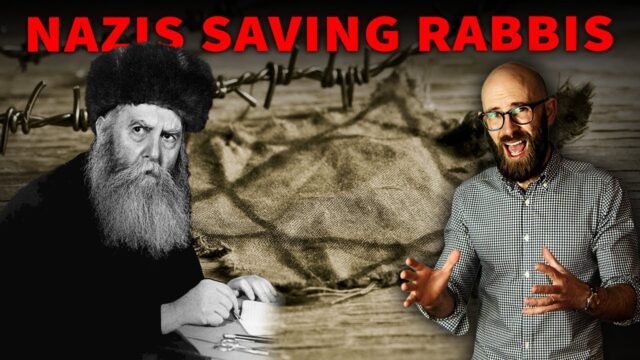“Unlikely Allies: The Shocking Nazi Mission to Rescue a Jewish Leader that Shook History”
But across the Atlantic, an unlikely rescue was being organized. Though at the time the Chabad movement in America was small, a small group of followers led by Brooklyn rabbi Israel Jacobson managed to hire Washington lobbyist Max Rhoade to petition for the Rebbe’s relocation to the United States. Rhoade contacted dozens of politicians including Supreme Court Justice Louis Brandeis; Sol Bloom, the head of the Foreign Affairs Committee of the House of Representatives; and New York Senator Robert Wagner, who on September 22 sent a telegram to U.S. Secretary of State Cordell Hull informing him that:
“Prominent New York citizens concerned about whereabouts of Rabbi Yosef Yitzchak Schneersohn, … present location unknown.”
Four days later, Mordecai Dubin in Riga telegrammed Rabbi Jacobson, describing his failed rescue attempt and urging him to:
“Save lives. Rabbi and family. Try every way. Every hour more dangerous. Answer daily what accomplished.”
Rhoade’s lobbying campaign quickly picked up steam, with Phillip Rosen, head of the American Jewish Joint Committee’s European office writing to the U.S. representative in Riga:
“Greatly interested world famous rabbi Schneersohn … now Muranowska 32 Warsaw. Urge your doing utmost to effect his protection and removal to Riga …”
And on September 29, New York attorney Arthur Rabinowitz wrote Justice Brandeis requesting:
“… any aid you can render possibly through Ben Cohen … feel justified in troubling you by extreme danger to Schneersohn’s life and his great moral worth to world Jewry.”
Benjamin Cohen was a member of President Franklin D. Roosevelt’s so-called “Brain Trust” and the author of several major pieces of New Deal legislation. As a former counsel for the American Zionist Counsel, Cohen was a staunch defender of the welfare of Jews around the world. Yet despite mounting pressure from within his administration, President Roosevelt, then running for a third term, was reluctant to intervene in the rapidly-escalating European war. At the time, isolationist and anti-semitic sentiment in the United States was at an all-time high, stoked by such figures as legendary aviator Charles Lindbergh and Catholic preacher and broadcaster Father Charles Coughlin. But Max Rhoade persisted, and by doggedly badgering figures such as Brandeis, Cohen, and Secretary of the Treasury Henry Morgenthau Jr., he finally succeeded in convincing the Roosevelt Administration to intervene on Rebbe Schneerson’s behalf – if only to throw the American Jewish community a bone and keep them quiet.
Luckily, while the American government had little interest in helping European Jewry, the government of the Third Reich had a keen interest in maintaining good diplomatic relations with the United States and keeping them out of the war. Benjamin Cohen thus contacted diplomat Robert Pell, whom he knew to be friends with German diplomat Helmut Wohlthat, head of Germany’s four-year economic plan. As Cohen suspected, Pell confirmed that Wohlthat was willing to cooperate, seeing the rescue of Rebbe Schneerson as a small price to pay for continued good relations. Pell conveyed this message to Secretary of State Hull, who telegrammed Wohlthat at the U.S. consul in Berlin to approve the extraction of the Rebbe from occupied Poland.
There was just one problem: Poland was under military and not civilian administration. Wohlthat thus appealed to Admiral Wilhelm Canaris, head of the Abwehr or German Army Intelligence Service. Secretly opposed to Nazi ideology, throughout the war Canaris committed numerous acts of internal sabotage and resistance against the regime, including passing vital intelligence to the Allies, helping 500 Jews escape the Netherlands in 1941, engineering the continued neutrality of Francoist Spain, and participating in the unsuccessful plot to assassinate Adolf Hitler on July 20, 1944. Canaris was eventually arrested on July 23, 1944, convicted of treason, and executed by hanging at Flossenbürg Concentration Camp on April 9, 1945.
To rescue the Rebbe, Canaris selected Major Ernst Bloch, a highly decorated Abwehr operative. A veteran of the First World War, in the interwar period Bloch served in a commercial branch of military intelligence that spied on visiting businessmen. He was also half-jewish on his father’s side – what in the pseudoscientific Nazi racial hierarchy was known as a mischlinge or “half-breed.” Despite their precarious position within Nazi society, more than 60,000 half-jews (AKA mischlinge first grade) and 90,000 quarter-jews (mischlinge second grade) served in the armed forces of the Third Reich. These included high-ranking officials such as Field Marshal Erhard Milch, head of the Reich Air Ministry or RLM, and amusingly, certain individuals used by the Reich Propaganda Ministry as examples of “ideal Aryans”. However, many important mischlinge like Milch or Bloch were granted official “German Blood Certificates” confirming them to be true Aryans or simply had their Jewish heritage conveniently ignored.


















